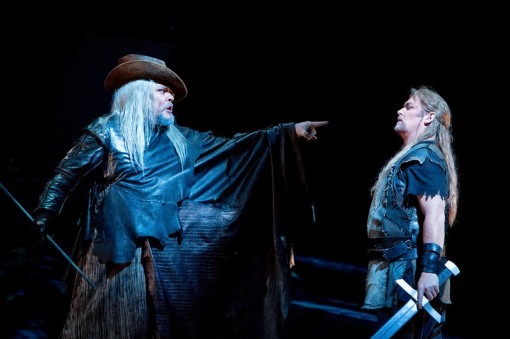Met’s Ring cycle reaches crushing speed with superb “Siegfried”

Mark Delavan as the Wanderer and Jay Hunter Morris as the title character in Wagner’s “Siegfried” at the Metropolitan Opera. Photo: Cory Weaver
Richard Wagner’s Siegfried, revived at the Metropolitan Opera on Saturday, had a famously fitful editorial history. Between 1851, when Wagner began sketching the drama that would become Siegfried, and its 1876 premiere, he set aside the Ring project, wrote Tristan und Isolde and Die Meistersinger, and fell under the spell of Arthur Schopenhauer’s philosophy, which emphasized the illusory nature of existence and the need to extinguish the “will to life” in order to overcome suffering.
That momentous encounter with Schopenhauer explains some of Siegfried’ s oddities. Though it takes its name from a protagonist who is nothing if not exuberant, it is an opera in which forward motion takes place by means of regression (quests for origins, obsessively revisited back-stories, recycled musical motifs). Wotan no longer seeks to make good his dodgy pursuit of freedom; instead, he awakens the all-knowing Erda to tell her of his “glad and joyous” embrace of extinction. And as they sing their euphoric, pulse-quickening love duet, Brünnhilde and Siegfried foresee not a happy life together but a “laughing death,” a hope that is itself a delusion, since they, like nearly all of Wagner’s lovers, perish apart.
Wagner couched these murky proceedings in resplendent music, which was mostly served well on Saturday. As in the Met’s Das Rheingold and Die Walküre, the lower voices carried the day in Siegfried, and for once director Robert Lepage and set designer Carl Fillion’s infamous machine worked some of the theatrical magic that it was built to conjure.
Pedro Pires’ video imagery for the forest conjures an animate underbrush, teeming with critters who dart and slither, its canopy a filigree of lazily swaying shadows cast by leaves and branches. Fafner in the guise of a dragon looks no more menacing than a Thanksgiving-parade balloon, but swords hiss and steam in the pool in Mime’s smithy, and the flames that soar around Brünnhilde’s rock tell of fears to be vanquished and death-besotted passions to be surrendered to.
For reasons unknown, Wotan the Wanderer in this staging is got up as Gregg Allman, with long, silky locks and a cowboy hat. Mark Delavan sang and acted brilliantly on Saturday, his tone black with irony as he greeted the “learned smith” Mime, and his eyes (or, rather, eye—Wotan has bartered one away) glinting with dark joy as he sang of the gods’ imminent destruction.
Eric Owens once again worked artistic wonders as Alberich—this tall, graceful man somehow transforming himself into a stunted, desperate creature who seems to suck everything on stage into his sinkhole of misery every time he appears. Owens’ enunciation was crisp and his tone unfailingly lush and strong. In booming voice even when he wasn’t amplified, Hans-Peter König was a genuinely terrifying Fafner—what sinister relish he conveyed when anticipating the pleasure of a tasty human snack. Gerhard Siegel managed to make the conniving, cruelly drawn Mime deeply sympathetic, and he sang and acted with manic, masterful energy.
Jay Hunter Morris as Siegfried sometimes overdid the bad-boy bits: kicks in the behind are for vaudeville, not for Siegfried’s encounter with the Wanderer, and his mouthing along to Mime’s self-pitying harangues made his already obnoxious character even less appealing. That said, Morris moves with boldness and dash and has that rarest of gifts in today’s opera world: he can sing Wagner’s punishing music. There can be little bloom to his sound, but he made much of Siegfried’s bewildered response to the sleeping Brünnhilde, his voice hushed with desire as he gazed upon the woman who has taught him fear and her “flower-like lips.”
As Brünnhilde, Deborah Voigt sang gamely, even mustering an approximation of a trill, but she often seemed stretched to the limit of her vocal resources. Her uppermost notes were just this side of screams, unknit with the rest of her voice, and her tone lacked richness in its middle and lower registers. She did manage to convey the former Valkyrie’s gradual, giddy surrender to Siegfried’s wooing, but why the tepid embraces? The production team needs to think less about the blasted machine and more about teaching Voigt and Morris to simulate a proper, vigorous snog.
Meredith Arwady as Erda summoned a sense of mystery but sounded underpowered in her role’s cavernous lower reaches. Lisette Oropesa as the Forest Bird chirped and warbled sweetly; Erik Ralske played Siegfried’s Act II horn fanfares with insolent bravura.
Fabio Luisi and the Met orchestra turned in their best work in this season’s Ring cycle so far in Siegfried. The maestro highlighted the sparkling, playful inner voices in Siegfried’s forging song, which so often seems nothing more than brassy bluster, and he shaped the riddle scene with tense, quicksilver finesse. The Met orchestra conjured stygian and phosphorescent tones for Erda’s apparition, and the arc of the third act—an ascent from the depths of Erda’s realm to the wispy heights where Brünnhilde and Siegfried exult in their love—unfolded with a spine-tingling sense of energy and inevitability.
The Metropolitan Opera’s Ring Cycle I concludes with Götterdämmerung on April 23. Ring Cycle II opens on April 25, and the season’s third and final Ring Cycle begins on May 4. metoperafamily.org; 212-362-6000.
Posted Apr 26, 2013 at 11:11 am by Chuck Anziulewicz
“Fafner in the guise of a dragon looks no more menacing than a Thanksgiving-parade balloon.”
Yeah, maybe they’ll get a REAL dragon next time. Jeez.